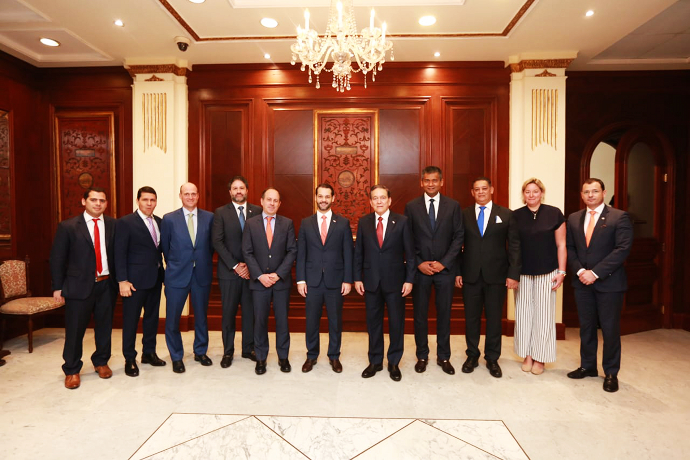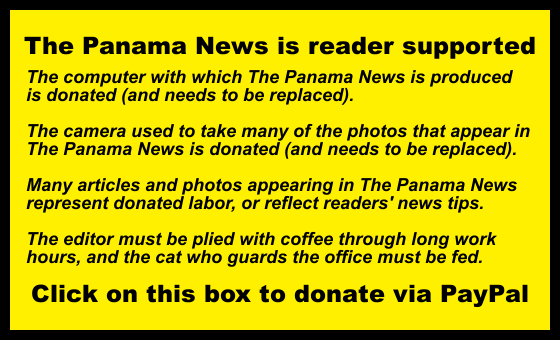The president posed earlier this month with a group of execs from Liberty Latin America, a Bermuda-based multinational telecom company, one of whose subsidiaries is Cable & Wireless. The Panamanian government owns a stake in Cable & Wireless Panama. Liberty says it will be undertaking a project here that will create 500 jobs. Photo by the Presidencia.
Cortizo’s mission to New York
by Eric Jackson
On Twitter, President Cortizo described the purposes of his trip to New York as “to attract investments, improve the economy, generate jobs and foment culture and tourism.”
Perhaps the most publicized stop on his itinerary will be his attendance at Mariano Rivera’s induction into the Baseball Hall of Fame in Cooperstown. The meeting with Citibank CEO Mike Corbat and the luncheon with representatives of the 40 US banks with corresponding bank relationships with their Panamanian counterparts may be the most important items. He’s also meeting with people from the Fitch Ratings, Moody’s Investors Service, Standard&Poor’s and Capital Markets bond rating services.
The principal mission, it seems, is to get Panama out from under foreign financial sector sanctions that come with inclusion on the “gray list” of the Organization for Economic Cooperation and Development’s Financial Action Task Force. Being on that list slows international financial transactions involving Panama and has led some European banks to cancel corresponding bank relationships with counterparts in Panama. That makes financial transfers between Panama and Europe slower. Perhaps worse at the moment for heavily indebted Panama, it could drive up the cost of government borrowing.
The most notorious reason for Panama’s listing – which could worsen to the blacklisting that entails a near-total international boycott – was the publication of “The Panama Papers,” a series of archives from the now defunct Mossack and Fonseca law firm, one of whose prinicipal partners who was at the time of the leak former president Juan Carlos Varela’s chief of staff, Ramón Fonseca Mora. Within that trove of documents were revealing tales of how chains of shell companies designed to conceal assets as they passed through multiple jurisdictions, whereby the rich, famous and politically connected evaded tax authorities in their countries and avoided discovery of illegally amassed wealth. In places like the United Kingdom, Pakistan, Iceland and Ireland, heads of government rolled over the scandal. Notables directly or indirectly implicated in places like Malta, Russia and China survived without much damage. One big remaining question was why so few prominent Americans were named. The line coming out of the Kremlin at the time was that The Panama Papers were an Obama administration hacking and cyber-propaganda operation aimed at destabilizing the Russian Federation and toppling its leader.
Mr. Fonseca and Mr. Varela had a falling out, which entailed revelations by the former that the latter took large sums of money from the hoodlum Brazilian construction conglomerate Odebrecht. Panama has probably not heard the end of that.
So what does President Cortizo propose to do to limit and repair the damage? He says that he will create a committee of public and private sector experts to recommend changes in Panama’s banking laws. Perhaps he will hear some suggestions while in New York that would help shape the process. However, after repeated scandals going back to Noriega times the banks have stopped being the main locus of money laundering here. It’s the law firms, the real estate business and the construction industry – in the latter of which Cortizo has been a player – where the main action is and has been for a long time. But the international bankers would know that, too.
In any case it will be harder to sell a “go easy on Panama” plea in Europe than in the USA. That the administration that just left set up Chinese lines of credit as a hedge might help the cash flow if there is a serious squeeze, but it also could enrage a belligerent and tantrum-prone guy in the Oval Office. Fiscally conservative Northern European politicians on both the left and right of their establishments don’t much like money laundering as a matter of their basic principles and they are having problems with neofascists looking to tie them to Third World sleaze if possible. Whoever comes after Angela Merkel, don’t expect much of a change of attitude with respect to Panama without some major changes in Panamanian international financial dealings.
Look at Cortizo’s representations to the banks and bond rating agencies as necessary first steps, but it may well be that the important things are not what he says but what he is told.
Will there be controversy in the most non-controversial and ceremonial stop, at which Cortizo will not be the focus? That will be the president’s attendance at the Cooperstown induction of Mariano Rivera into baseball’s hall of fame. Perhaps somebody will get Cortizo’s ear and advise him to do something about Panama’s politically dominated, looted and ailing baseball scene. We are likely to see smiling photos on the Presidencia’s website and not hear or read much baseball talk as such.
Prior to setting out for New York, the Cortizo administration announced that there will be a musical component to promoting Panama as a tourist destination, with jazz pianist and educator Danilo Pérez a headliner of that effort. That’s an easy one, as Danilo and Patricia have been doing it for years via the Panama Jazz Festivals. We shall see what more it all entails.
Tourism is a problem to the extent that Americans are the customers, here and everywhere. Flagrant US racism and xenophobia and an unstable US president have prompted negative reactions around the world, which in turn leads some people in just about every overseas destination to be rude or dismissive with American tourists. That’s bound to affect international travel by Americans, but the numbers we have are not very precise and not well segmented. In Panama tourism is down, but we don’t get a breakdown of say, which Americans are coming to visit with lawyers about setting up shell companies and which are coming to catch a sailfish.
In the previous week a lot of venom was spat from New York at Panama’s communities of Venezuelans, Americans, Jews and Panamanians identified as foreigners at the instigation of a Panamanian legislator of his own party. However, there seems not to be any plan to meet with community leaders in Brooklyn in particular and the metro New York area in general to disavow the racism and xenophobia that is certain to harm the Panamanian tourism sector. Cortizo, like US Democrats, may also pause to think about what it means to have social media troll campaigns coming in from abroad to affect Panamanian politics.
Jobs for Panamanians? One might expect that Cortizo hopes to return with some contract or announcement about some company locating some facility here. Let’s see.
The trip to New York isn’t just a one man show. Along with the president the entourage includes the ministers of foreign relations and tourism, the vice ministers of economy and finance, the director of the Banco Nacional and special presidential aides in charge of facilitating foreign investment and advising Cortizo on international matters. If hustling some business deals is a big part of the mission, the successes to show may not be immediate, but rather as a result of relationships made with members of the Cortizo team.
These links are interactive — click on the boxes













